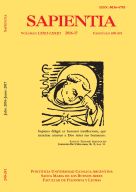Por favor, use este identificador para citar o enlazar este ítem:
https://repositorio.uca.edu.ar/handle/123456789/4618| Campo DC | Valor | Lengua/Idioma |
|---|---|---|
| dc.contributor.author | Aracoeli Beroch, María | es |
| dc.date.accessioned | 2019-06-01T18:43:37Z | - |
| dc.date.available | 2019-06-01T18:43:37Z | - |
| dc.date.issued | 2017 | - |
| dc.identifier.citation | Aracoeli Beroch, M. Nota sobre la noción de amor sui en Tomás de Aquino : reflexividad de la voluntad y subjetividad humana [en línea]. Sapientia. 2017, 72-73 (240-241). Disponible en: https://repositorio.uca.edu.ar/handle/123456789/4618 | es |
| dc.identifier.issn | 0036-4703 | - |
| dc.identifier.uri | https://repositorio.uca.edu.ar/handle/123456789/4618 | - |
| dc.description.abstract | Resumen: El artículo se propone revisar el significado de amor sui en algunos de los principales textos tomistas donde se menciona, con el fin de determinar si puede ser un elemento que contribuya a una teoría tomista de la subjetividad. Para esto se desarrolla, en primer lugar, la reflexividad de la voluntad, como apetito intelectivo que tiene la capacidad de volver sobre su propio acto (voluntas vult se velle). Esta característica de la facultad permite afirmar que el hombre vuelve sobre sí mismo, no solo a través del intelecto sino también de la voluntad. En un segundo momento se considera la noción de amor/dilectio sui: el amor tiende a un doble objeto, a saber, el bien que se quiere y la persona para quien se quiere ese bien. De este modo es posible destacar el primado del sujeto agente, que, en el caso del amor sui, retorna sobre sí mismo, amándose, y mantiene el amor a sí mismo aún en relación con los demás hombres y a Dios. | es |
| dc.description.abstract | Abstract: The article proposes to revise the meaning of amor sui in some of the main Thomistic texts where the term is mentioned, in order to determine whether it may contribute to a Thomistic theory of subjectivity. In the first place, the reflexivity of the will is explained as an intellectual appetite that has the capacity to turn back on its own act (voluntas vult se velle). This characteristic of the faculty enables one to affirm that man turns back upon himself, not only by means of the intellect but also by means of the will itself. Secondly, the notion of amor/dilectio sui is considered: love tends toward a double object; that is, the good that is desired, and the person for whom this good is desired. In such a way, it is possible to highlight the importance of the subject acting, who, in the case of amor sui, returns toward himself, loving himself and maintaining the love for himself even in relation to other men and to God. | es |
| dc.format | application/pdf | es |
| dc.language.iso | spa | es |
| dc.publisher | Pontificia Universidad Católica Argentina. Facultad de Filosofía y Letras | es |
| dc.rights | Acceso Abierto | es |
| dc.rights.uri | https://creativecommons.org/licenses/by-nc-sa/4.0/ | es |
| dc.source | Sapientia, Vol. LXXII-LXXIII, n° 240-241, 2016-2017 | es |
| dc.subject | FILOSOFIA | es |
| dc.subject | Tomás de Aquino, Santo, 1225?-1274 | es |
| dc.subject | AMOR | es |
| dc.subject | SUBJETIVIDAD | es |
| dc.subject | SI MISMO | es |
| dc.subject | VOLUNTAD | es |
| dc.title | Nota sobre la noción de amor sui en Tomás de Aquino : reflexividad de la voluntad y subjetividad humana | es |
| dc.type | Artículo | es |
| uca.path | Sapientia|2016-2017 Vol LXXII-LXXIII n° 240-241 | es |
| uca.disciplina | FILOSOFIA | es |
| uca.filename | /home/data-uca-generic/folder_generic/sapientia240-241/nota-nocion-amor-sui/metadata.xml | es |
| uca.issnrd | 1 | es |
| uca.affiliation | Fil: Aracoeli Beroch, María. Pontificia Università San Tommaso d’Aquino; Italia | es |
| uca.orden | 02 | es |
| uca.version | publishedVersion | es |
| item.languageiso639-1 | es | - |
| item.fulltext | With Fulltext | - |
| item.grantfulltext | open | - |
| Aparece en las colecciones: | SAP - 2016-2017 Vol LXXII-LXXIII nro. 240-241 | |
Ficheros en este ítem:
| Fichero | Descripción | Tamaño | Formato | |
|---|---|---|---|---|
| nota-nocion-amor-sui.pdf | 290,14 kB | Adobe PDF |  Visualizar/Abrir |
Visualizaciones de página(s)
149
comprobado en 30-abr-2024
Descarga(s)
582
comprobado en 30-abr-2024
Google ScholarTM
Ver en Google Scholar
Este ítem está sujeto a una Licencia Creative Commons

